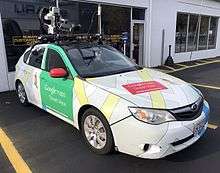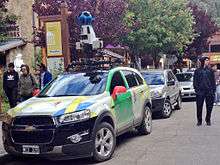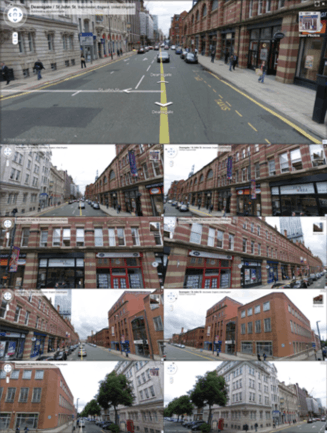Google Street View
 | |
|
A road junction in Manchester, England, showing nine different angles | |
| Initial release | May 25, 2007 |
|---|---|
| Stable release |
Release 206 (see list)
/ November 10, 2016 |
| Available in | Multiple languages |
| Website | Google Street View |
Google Street View is a technology featured in Google Maps and Google Earth that provides panoramic views from positions along many streets in the world. It was launched in 2007 in several cities in the United States, and has since expanded to include cities and rural areas worldwide. Streets with Street View imagery available are shown as blue lines on Google Maps.
Google Street View displays panoramas of stitched images. Most photography is done by car, but some is done by trekker, tricycle, walking, boat, snowmobile, and underwater apparatus.
History and features
Street View had its inception in 2001 with The Stanford CityBlock Project, a Google-sponsored Stanford University research project. The project ended in June 2006, and its technology was folded into StreetView.[1]
- 2007: Launched on 25 May in the United States using Immersive Media technology.
- 2008: In May Google announces that it was testing face-blurring technology on its photos of the busy streets of Manhattan.[2] The technology uses a computer algorithm to search Google's image database for faces and blurs them.[3] Street View integrated into Google Earth 4.3, the Maps application on the Apple iPhone, and the Maps application for S60 3rd Edition. In November, the drag and drop Pegman icon is introduced as the primary user interface element for connecting from Maps's 2D view into Street View's 3D view. When Pegman is dropped onto a particular set of coordinates in Google Maps for which Street View data is available, Street View opens and takes over the whole map window.
- 2009: Introduction of full-screen option. Smart Navigation introduced allowing users to navigate around the panoramas by double-clicking with their cursor on any place or object they want to see.[4]
- 2010: Indoor views of businesses available.[5] Google invites users to contribute panoramas of their own using gadgets with Android 4.2. Google highlights user-contributed panoramas with blue circle icons on Maps. The company also created a website to highlight places in the world where one can find them.[6]
- 2013: Business interior views are shown as small orange circles. Businesses such as shops, cafés and other premises can pay a photographer to take panoramic images of the interior of their premises which are then included in Street View.[7] Google sets up program to let third parties borrow the Street View Trekker (a backpack mounted camera) and contribute imagery to Google Maps.[8]
- 2014: Street-level imagery from the past can now be seen, if available for a given street view.[9]
- 2015: A partnership was announced between Street View and the environmental monitoring company Aclima. Cars began carrying sensors to detect pollutants such as nitrogen dioxide, ozone, and particulate matter.[10] In October, support for Google Cardboard was announced allowing users to explore street view in 360 degree virtual reality.[11]
Implementation
Street View is available as a component of Google Maps, as a web application, and as a mobile application for Android and iOS. Originally, Google Maps used Adobe Flash for Street View.[12] Google overhauled Google Maps in 2013. The newer version uses JavaScript extensively and has a JavaScript application programming interface.[13] The new Google Maps and Street View are slower than the old version.[14][15] A user can switch to the old version of Google Maps, which is especially useful when Google Maps is more sluggish than usual.[16][17]
Data capturing equipment
- Cameras: Street View imagery has come from several generations of camera systems developed in-house.[18] The cameras contain no mechanical parts, including the shutter, instead using CMOS sensors and an electronic rolling shutter. Widely deployed versions are:
- R2: the earliest photos were captured with a ring of eight 11-megapixel CCD sensors with commercial photographic wide-angle lenses.
- R5: uses a ring of eight 5-megapixel CMOS sensors with custom low-flare lenses, plus a fisheye lens on top to capture upper levels of buildings.
- R7: uses 15 of the same sensors and lenses as R5, but no fish-eye.
- Positioning: recorded photographs must be associated with accurate positioning. This is done via a Global Positioning System, wheel speed sensor, and inertial navigation sensor data.[18]
- Laser range scanners from Sick AG for the measuring of up to 50 meters 180° in the front of the vehicle.[19] These are used for recording the actual dimensions of the space being photographed.
- Vehicles: data recording equipment is usually mounted on the roof of a car. A Trike (tricycle) was developed to record pedestrian routes including Stonehenge, and other UNESCO World Heritage sites. In 2010 a snowmobile-based system captured the 2010 Winter Olympics sites.[18] Trolleys have been used to shoot the insides of museums, and in Venice the narrow roads were photographed with backpack-mounted cameras, and canals were photographed from boats.[20]
- A portable back-pack Google Trekker is used in outdoor terrain. For instance, the six main paths up Snowdon were mapped by the Google Trekker in 2015.[21]
Pegman
As noted above, the drag-and-drop Pegman icon is the primary user interface element used by Google to connect Maps to Street View. His name comes from his resemblance to a clothespeg. When not in use, Pegman sits atop the Google Maps zoom controls. Occasionally Pegman "dresses up" for special events or is joined by peg friends in Google Maps. When dragged into Street View near Area 51, he becomes a flying saucer. When viewing older views, the Pegman in the minimap changes to Doc Brown from Back to the Future.
Pegman has occasionally appeared as a costumed character at Google events, such as the launch of Street View in France in 2008.
Privacy concerns

Google Street View will blur houses for any user who makes a request, in addition to the automatic blurring of faces and licence plates.[22] Privacy advocates have objected to the Google Street View, pointing to views found to show men leaving strip clubs, protesters at an abortion clinic, sunbathers in bikinis, and people engaging in activities visible from public property in which they do not wish to be seen publicly.[23] Another concern is the height of the cameras, and in at least two countries, Japan[24] and Switzerland,[25] Google has had to lower the height of its cameras so as to not peer over fences and hedges. The service also allows users themselves to flag inappropriate or sensitive imagery for Google to review and remove.[26] Police Scotland received an apology for wasting police time in 2014 from a local business owner in Edinburgh who in 2012 had staged a fake murder for the Google camera car by lying in the road "while his colleague stood over him with a pickaxe handle".[27] In May 2010, it was revealed that Google had collected and stored payload data from unencrypted Wi-Fi connections as part of Street View.[28] German authorities are considering legal action while the Foreign Minister said "I will do all I can to prevent it." Australian police have also been ordered to investigate.[29]
The concerns have led to Google not providing or suspending the service in countries around the world.
- Austria: Google Street View was banned in Austria because Google was found to collect Wifi data unauthorized in 2010. After the ban was lifted rules were set up for how Street View can operate legally in Austria. Google has yet to resume service. Officially it welcomed the new guidelines but has ruled out operating under them. As of 2016 Google Street View is still unavailable.[30]
- Australia: In 2010, Google Street View ceased operations in Australia, following months of investigations from Australian authorities.[31] However, this cessation has since ended, with Google announcing plans to continue production on May 4, 2011[32] and subsequently releasing updated Street View imagery for Australian towns and cities on July 27, 2011.[33]
- Germany: In 2011, Google stopped taking Street View images in Germany.[34]
- India: In 2011, Google stopped taking street images in India, after receiving a letter from the local authorities.[35]
- Canada: Street View cars had been spotted as early as September 2007, in Montréal, though service for Canada was delayed while attempting to settle with the Canadian government over its privacy laws. Privacy and town beauty concerns were dealt with and Street View is available in Montréal and other Canadian cities (as of 2016).
Third-party use of images
Fine-art photographers have selected images for use in their own work.[36] Although the images may be pixelated, the colours muddy, and the perspective warped, the photographs have been published in book form and exhibited in art galleries, such as the work of Jon Rafman at the Saatchi Gallery, London.[37] In his personal appreciation of Street View material, Rafman sees images which evoke the "gritty urban life" depicted in American street photography and the images commissioned by the Farm Security Administration. He also invokes the "decisive moment" esthetic of Henri Cartier-Bresson "as if I were a photojournalist responding instantaneously to an emerging event".[38]
Michael Wolf won an honourable mention in Daily Life in the 2011 World Press Photo competition for some of his work using Google Street View.[39]
Mishka Henner was short-listed for the 2013 Deutsche Börse Photography Prize in November 2012 for his series 'No Man's Land', which depicts sex workers at rural roadside locations.[40]
Swedish programmer Anton Wallén developed a game called GeoGuessr, which places players into a Google Street View and has them guess its location.[41]
Coverage

In June 2012, Google announced that it has captured 20 petabytes of data for Street View, comprising photos taken along 5 million miles of roads, covering 39 countries and about 3,000 cities.[42] Coverage includes much of North and South America, from Cambridge Bay, Nunavut to Half Moon Island in the South Shetland Islands.[43] Maps also include panoramic views taken under water such as in West Nusa Tenggara underwater coral, in the Grand Canyon, inside museums, and Liwa Desert in United Arab Emirates which are viewed from camelback.[44] In a ten-day trek with Apa Sherpa, Google documented Khumbu, Nepal with its Mount Everest, Sherpa communities, monasteries and schools.[45]
Google also added landmarks in Egypt, including the Pyramids of Giza, Cairo Citadel, Saqqara, Monastery of Saint Mina, and the Citadel of Qaitbay in the 9 September 2014 release.
Many places still have limited or no coverage, including:
- The Caribbean except limited coverage in the United States Virgin Islands, and some touristic places in Martinique: Boucle d'Absalon, Habitation Clément and the south-western coast of Sainte-Anne
- Central America
- French Guiana, Guyana, Paraguay, Suriname and Venezuela in South America
- Africa except Botswana, Lesotho, South Africa, Swaziland, Uganda and some city views in Madagascar
- Austria, Belarus, Bosnia and Herzegovina, Kosovo, Liechtenstein, Malta, Moldova and much of Germany in Europe
- Asia except Bangladesh, Bhutan, Cambodia, Hong Kong, Japan, Macau, Malaysia, Singapore, Sri Lanka, Taiwan, Thailand, much of Indonesia, Kyrgyzstan, Laos, Mongolia, Philippines, Russia and some locations in South Korea (such as Seoul and Busan)
- The Middle East except Israel, Turkey and the United Arab Emirates
- The South Pacific, except American Samoa, Australia and New Zealand
Gallery
- Street View camera showcased on campus
 Google Street View camera mounted on a "trike", on display at the Computer History Museum in Mountain View, California
Google Street View camera mounted on a "trike", on display at the Computer History Museum in Mountain View, California The cameras of this Google Street View car are mounted on the roof rack. The power and data cables are fed into the car through the right rear passenger window.
The cameras of this Google Street View car are mounted on the roof rack. The power and data cables are fed into the car through the right rear passenger window.- Google Trike in Cambridge Bay, Nunavut, August 2012
 Chevrolet Captiva Street View in Patagonia, Argentina, February 2014
Chevrolet Captiva Street View in Patagonia, Argentina, February 2014
See also
- List of street view services
- Aspen Movie Map (oldest project of this type)
- Route inspection problem (algorithmic problem related to the planning of Street View car routes)
- Historypin: a user-generated archive of historical photos, videos, audio recordings and personal recollections.
References
- ↑ "The Stanford CityBlock Project: multi-perspective panoramas of city blocks". Retrieved 30 August 2014.
- ↑ Frome, Andrea (May 12, 2008). "Google's LatLong Blog". Google-latlong.blogspot.com. Retrieved August 27, 2010.
- ↑ Shankland, Stephen. "CNet article "Google begins blurring faces in Street View"". News.cnet.com. Retrieved August 27, 2010.
- ↑ "PC World article "Google Street View Gets Smart Navigation"". Pcworld.com. June 5, 2009. Retrieved August 27, 2010.
- ↑ Nalawadi, Shailesh (2012-09-18). "An easier way to find panoramic interior imagery in Google Maps". Google-latlong.blogspot.co.il. Retrieved 2013-12-23.
- ↑ "Contribuiți – Street View – Hărţi Google". Google.ro. Retrieved January 19, 2013.
- ↑ Smith, Mark (2013-05-03). "Google Street View gets peek inside Sheffield university buildings | Technology | guardian.co.uk". London: Guardian. Retrieved 2013-06-15.
- ↑ "Treks". Google. Retrieved 2 September 2014.
- ↑ "Google introduces 'time machine' feature in Street View". The Guardian. 23 April 2014. Retrieved 31 August 2014.
- ↑ Gershgorn, Dave (30 July 2015). "Google Will Start Mapping Pollution The Same Way They Map Streets". Popular Science. Retrieved 30 July 2015.
- ↑ Lopez, Napier (12 Oct 2015). "Google Street View adds virtual reality support". NextWeb.
- ↑ Arthur, Charles (20 March 2009). "Where the Streets All Have Google's Name". The Guardian.com (US ed.).
- ↑ Jones, Robert (17 January 2014). "Google Street View Image API". Web Apprentice. Craic Computing LLC. Retrieved 3 September 2014.
- ↑ The new Street View on Google Maps is very slow (Google Maps Help Forum, 26 February 2014)
- ↑ Tired of new, slow Google Maps? This is how you can switch to the old version! (Geoawesomeness, June 12, 2014)
- ↑ "Switch back to the classic version of Maps". Google. Retrieved 5 September 2014.
- ↑ Switching Back to the Old Google Maps (Netvantage Marketing, 2 January 2014)
- 1 2 3 "Google Street View: Capturing the world at street level". Computer. 43 (6): 32–38. June 2010. doi:10.1109/mc.2010.170. Retrieved 31 August 2014.
- ↑ Cummins, Mark. "Google Street View – Soon in 3D?". Educating Silicon. Retrieved January 3, 2012.
- ↑ "Google Street View takes Venice by foot". The Guardian. Retrieved 31 August 2014.
- ↑ Crump, Eryl (11 December 2015). "Take a tour of Snowdonia - with Google Street View". Retrieved 9 October 2016.
- ↑ "Mansion Map: a guide to rich people's houses, until Google blurs them out". The Guardian. Retrieved 31 August 2014.
- ↑ MacDonald, Calum (June 4, 2007). "Google's Street View site raises alarm over privacy". The Herald. Archived from the original on February 13, 2009. Retrieved April 1, 2009.
- ↑ Wenkart, Michael (2014-04-10). You are the target !: Or do you believe your government is always watching the others?. BoD – Books on Demand. p. 171. ISBN 9783735793553. Retrieved 2014-12-28.
- ↑ O'Brien, Kevin (2012-06-08). "Swiss Court Orders Modifications to Google Street View". New York Times. New York, NY. Retrieved 2014-12-28.
- ↑ Mills, Elinor (June 3, 2007). "Google's street-level maps raising privacy concerns". USA Today. Retrieved April 1, 2009.
- ↑ "Garage owner fakes Google 'murder' in Edinburgh street". BBC News. June 2, 2014. Retrieved February 20, 2015.
- ↑ "Google admits it sniffed out people's data". TechEye. May 17, 2010.
- ↑ "Google accused of criminal intent over StreetView data". BBC Online. June 9, 2010. Retrieved June 10, 2010.
- ↑ http://www.kleinezeitung.at/lebensart/multimedia/4180750/Datenschutz_Kein-Google-Street-View-fur-Osterreich
- ↑ "Google street view cars no longer operational in Australia – Computer world.com – November 9, 2010". Computer world.com. October 29, 2010. Retrieved December 11, 2010.
- ↑ Eustace, Alan. "Privacy Impact Assessment for Street View in Australia". Google Inc. Retrieved August 12, 2011.
- ↑ Foster, Andrew. "Updates to Street View in Australia". Google Inc. Retrieved August 12, 2011.
- ↑ McCracken, Harry (April 11, 2011). "Alas, There Will Be No More Google Street View in Germany". Techland.time.com. Retrieved December 16, 2011.
- ↑ "India IT hub orders Google to suspend Street View service – International Business Times". Hken.ibtimes.com. June 21, 2011. Retrieved December 16, 2011.
- ↑ Rickard, Doug (2010). A New American Picture. Köln: White Press. OCLC 727797183.
- ↑ "The street views Google wasn't expecting you to see – in pictures". The Guardian. London. February 20, 2012. Retrieved February 20, 2012.
- ↑ Jon Rafman, The Nine Eyes of Google Street View, Introduction, Jean Boîte Editions, 2011. ISBN 978-2-36568-001-1.
- ↑ Laurent, Olivier (February 11, 2011). "World Press Photo: Is Google Street View Photojournalism?". British Journal of Photography.
- ↑ "Deutsche Börse Photography Prize". Accessed 15 March 2013
- ↑ Hartnett, Kevin (May 17, 2013). "If dropped randomly on earth, would you know where you were?". The Boston Globe. Boston. Retrieved May 20, 2013.
- ↑ Farber, Dan. "Google takes Street View off-road with backpack rig". CNET. Retrieved 7 September 2012.
- ↑ "BBC News – Google Street View hits Antarctic". BBC. October 1, 2010. Retrieved December 16, 2011.
- ↑ Adi Kurniawan (October 9, 2014). "Pakai Unta, Google Petakan Padang Pasir".
- ↑ Apa Sherpa. "Growing up in the shadow of Everest". Retrieved March 12, 2015.
External links
| Wikimedia Commons has media related to Google Street View. |

